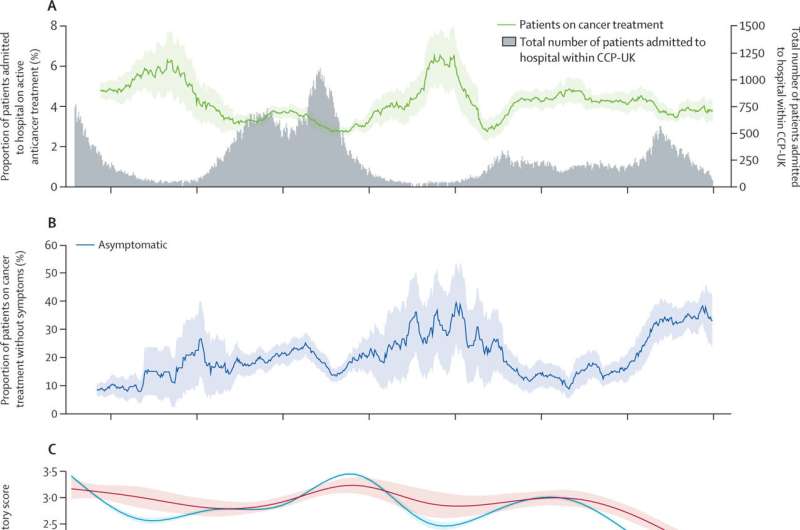This article has been reviewed according to Science X's editorial process and policies. Editors have highlighted the following attributes while ensuring the content's credibility:
fact-checked
peer-reviewed publication
trusted source
proofread
COVID-19 poses greater risk of death to those with cancer, large study finds

Researchers from the University of Liverpool and the University of Edinburgh have found evidence that shows that people with cancer face a higher risk of mortality from COVID-19 compared with those without cancer.
In a paper published in The Lancet Oncology, researchers show that during the pandemic, patients aged under 50 undergoing cancer treatment had the highest risk of in-hospital death compared to patients of the same age without cancer. Led by Professor Carlo Palmieri and Professor Lance Turtle, the study's findings show continued action is needed to mitigate the poor outcomes in patients with cancer.
One of the largest studies of its kind, it compared more than 6,500 cancer patients receiving treatment with more than 177,000 non-cancer patients. In all, 31.7% of cancer treatment patients died at 30 days, significantly more than for non-cancer patients, where 18% died 30 days after contracting COVID-19.
Significantly, the evidence shows that younger patients (
The study set out to determine how various factors that influence the risk of death from COVID-19 might differently affect patients undergoing cancer treatment. The investigators found that the number of other heath conditions did not affect the risk of death from COVID in cancer patients, unlike patients without cancer.
Patients who were frail, on the other hand, were more likely to die from COVID if they were also having cancer treatment. Measures that hospitals routinely record to determine how sick patients are, were similar between patients with cancer and non-cancer patients, but despite this the cancer patients were still more likely to die.
The study also examined changes in hospital mortality during the first two years of the COVID-19 pandemic in the U.K. The death rate of patients in hospital fell in both cancer and non-cancer patients over this period. However, the rate of fall was not constant, and the situation for cancer patients improved more slowly overall.
The study found that deaths were always higher in cancer patients receiving treatment compared to patients without cancer. While deaths decreased in cancer patients over the pandemic they never reached the levels seen for patients without cancer. In addition, there were two periods when the difference in mortality between patients with and without cancer increased before decreasing.
Professor Carlo Palmieri, from the University of Liverpool and Clatterbridge Cancer Center NHS Foundation Trust said, "Cancer patients are at greater risk of death from COVID-19 than many other patient groups. However, how this risk has evolved during the pandemic remains unclear. This large-scale study helps us better understand these risks and illustrates that more action is needed—for example through optimizing vaccination, long-acting passive immunization, and early access to therapeutics.
"Further work is also now required to understand the differences seen between cancer patients receiving treatment and non-cancer patients, and how age, cancer type and treatment may have impacted on mortality or escalation of care, as well as the possible influence of vaccination and socio-economic factors."
Professor Lance Turtle, of the University of Liverpool, said, "This study underlines the fact that, while COVID-19 has become much less of a risk for most people, there are groups who are much more vulnerable to the effects of COVID-19. While the situation has improved for these groups, their risk has probably not gone back down to what it was pre-pandemic.
"For patients and doctors contemplating cancer treatment, or other treatments that suppress the immune system, the risk of COVID-19 remains a concern."
More information: Lance Turtle et al, Changes in hospital mortality in patients with cancer during the COVID-19 pandemic (ISARIC-CCP-UK): a prospective, multicentre cohort study, The Lancet Oncology (2024). DOI: 10.1016/S1470-2045(24)00107-4



















